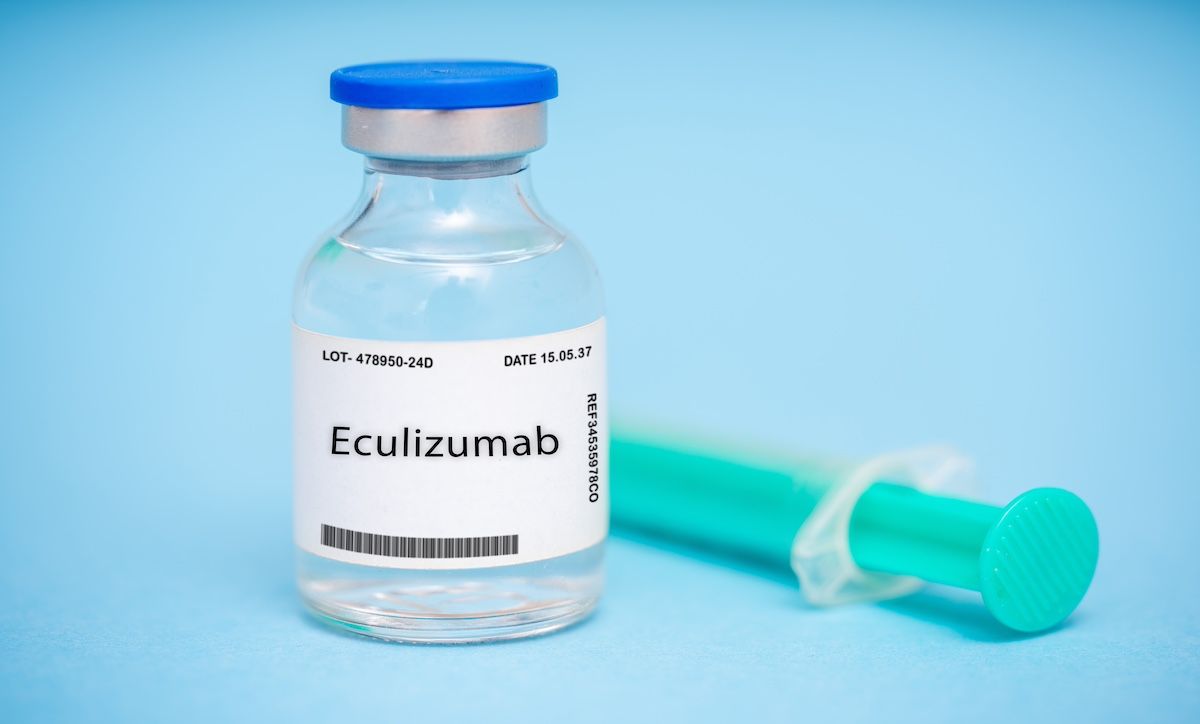- Center on Health Equity & Access
- Clinical
- Health Care Cost
- Health Care Delivery
- Insurance
- Policy
- Technology
- Value-Based Care
Long-Term Data Affirm Efficacy of Eculizumab in Refractory Generalized MG
A new survey has found that most patients who have generalized myasthenia gravis who switched from eculizumab to ravulizumab preferred the latter.
Eculizumab (Soliris; Alexion) is an effective long-term therapy for patients with acetylcholine receptor (AChR)-positive generalized myasthenia gravis (gMG) that is refractory to conventional therapy, according to a new study.
The report also found that patients who switched from eculizumab to ravulizumab (Ultomiris; Alexion) also found success. The study was reported in Annals of Clinical and Translational Neurology.
GMG is generally treated with corticosteroids, steroid-sparing immunosuppressive therapies, and fast-acting treatments like plasmapheresis and intravenous immunoglobulin, wrote the study authors. However, between 15% and 25% of patients with gMG will not sufficiently respond to those therapies, they said. Refractory disease, they continued, is characterized by limited quality of life, MG exacerbations, hospitalizations, and myasthenic crises.”
Study authors say younger patients should preferentially receive eculizumab because of the long-term implications of gMG and the long-term benefits of treating it | Image Credit: luchschenF - stock.adobe.com

Eculizumab is a humanized monoclonal antibody that binds to human terminal complement protein 5 (C5). In clinical trials and real-world usage, the therapy has been shown to be safe and effective in patients with refractory gMG, the authors said. Yet, not all patients who take the therapy see the same degree of success, and some patients who discontinue eculizumab opt to start therapy with ravulizumab.
“Ravulizumab is a humanized monoclonal antibody partly modified from eculizumab with C5 inhibitory effect in the same way,” the authors said. “Ravulizumab has been developed using Xencor's antibody half-life prolongation technology, which utilizes antibody Fc variants to prolong half-life.”
However, it is not clear how patients who discontinue eculizumab fare over the long term.
In the new study, the investigators used a Japanese MG registry to identify patients with AChR gMG who received eculizumab, including those who switched to ravulizumab. They used the MG Activities of Daily Living (MG-ADL) assessment to track patient improvement, and surveyed patients about their preference between eculizumab and ravulizumab.
Of more than 1100 patients in the registry, the investigators found 36 patients who received eculizumab; their mean duration of treatment was 35 months.
The investigators noted that Japan has guidelines limiting which patients with MG should receive eculizumab.
“Japanese guidelines for MG recommended that eculizumab should be used only when management of MG is difficult despite intravenous immunoglobulin and plasmapheresis in addition to steroids and immunosuppressive drugs,” they said. Accordingly, they said the therapy was preferentially used in severe and refractory cases of MG.
Suzuki and colleagues found that 25 of the patients with gMG responded to eculizumab, and MG-ADL scores improved from a mean (SD) 9.4 (4.9) to 5.9 (5.1).
Thirteen patients did not continue with eculizumab treatment. Of those, 2 patients dies (stroke and cervical cancer), but had previously responded to the therapy. Six patients discontinued due to efficacy.
Fifteen patients overall switched from eculizumab to ravulizumab. Those patients had favorable responses, the authors said, with MG-ADL scores of 6.2 (4.7) at the start of ravulizumab and 5.9 (5.1) after 26 weeks.
In questionnaires, 9 of 14 patients who completed the questionnaire said they preferred ravulizumab because it was more convenient and led to a better quality of life.
The investigators said their data suggest that eculizumab is particularly effective in patients with early onset MG compared with late-onset MG and thymoma-associated MG. They said one reason might be that severe MG was more likely among those with early onset MG. However, they added that postmarket surveys in Japan found eculizumab was most effective in thymoma-associated MG.
The authors said, however, that younger patients should preferentially receive eculizumab because of the long-term implications of the disease and the long-term benefits of treating it effectively.
Reference
Tokuyasu D, Suzuki S, Uzawa A, et al. Real-world experience with eculizumab and switching to ravulizumab for generalized myasthenia gravis. Ann Clin Transl Neurol. Published online April 4, 2024. doi:10.1002/acn3.52051
